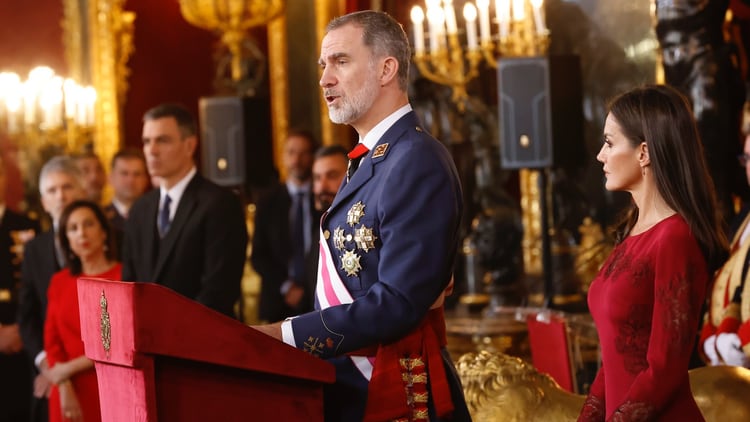The Diplomat
His Majesty the King yesterday, during Military Easter, expressed his support for the “significant” increase in military spending approved by the Government in the General State Budget for 2023, pointing out that it is justified by the invasion of Ukraine.
In a celebration at the Royal Palace, in which the Military Easter returned to its usual format after the restrictions imposed by the pandemic, Felipe VI expressed his recognition and appreciation to the Armed Forces, the Civil Guard and members of the National Intelligence Centre (CNI), conveying his “admiration and pride” for the work they carry out “in defence of constitutional values and international legality”.
In this context, the Monarch recalled that the year 2022 was marked by the invasion of Ukraine, which “has seriously altered,” he said, “the international order and puts European security at serious risk”.
Don Felipe welcomed the united response of those who defend “international law, freedom, peace, democratic values and an international order based on rules”; insisting that the invasion has resulted in a strengthening of “cohesion” and the creation of a “common front” against war.
After describing the war in Ukraine as “unjustifiable, illegal and brutal”, he pointed out that it is a challenge facing us Europeans and that “it has made clear the importance of investing in defence, given the need for armies and navies to have “the necessary resources to guarantee the highest quality training, sufficient military capabilities and cutting-edge technology, and flexible and appropriate operations”.
He referred to the increase in investment in the 2023 Budget and said that now the “challenge” is to acquire the means and provide military units with what is necessary to achieve a force that is “even more modern, effective, viable and sustainable in the medium and long term”.
In his speech, the monarch praised the work of the military both within Spain and in the international missions in which they participate, and took the opportunity to pay tribute to those who died last year, of whom he highlighted their “exemplary nature and vocation of service to Spain”.
He also recalled the NATO Summit held in Madrid last June, coinciding with the 40th anniversary of Spain’s accession to the Atlantic Alliance, which he described as a “historic and transcendental” event that helped to consolidate the country’s transition process “towards a modern and democratic society”.
For her part, the Minister of Defence, Margarita Robles, stressed in her speech the government’s “effort” to increase defence spending in a context marked by the war in Ukraine, with an increase of 25.8 percent for this year.
The minister, who considered the invasion of Ukraine to be a war against the whole of Europe, against democratic values and the “peaceful coexistence of nations”, insisted that the increase in military investment, in addition to a commitment “to peace and security”, represents a “clear and decisive” commitment to Spanish industry and the creation of jobs.
In contrast, Pablo Echenique, parliamentary spokesman for Unidas Podemos, the party that governs in coalition with the PSOE, criticised Felipe VI’s words, saying on his Twitter account: “The king is asking to spend more public money on bombs and weapons. One thing you have to recognise about the man: he is never wrong when it comes to choosing an electoral programme. He is very clear about the model of country and society he defends and who he represents”.







